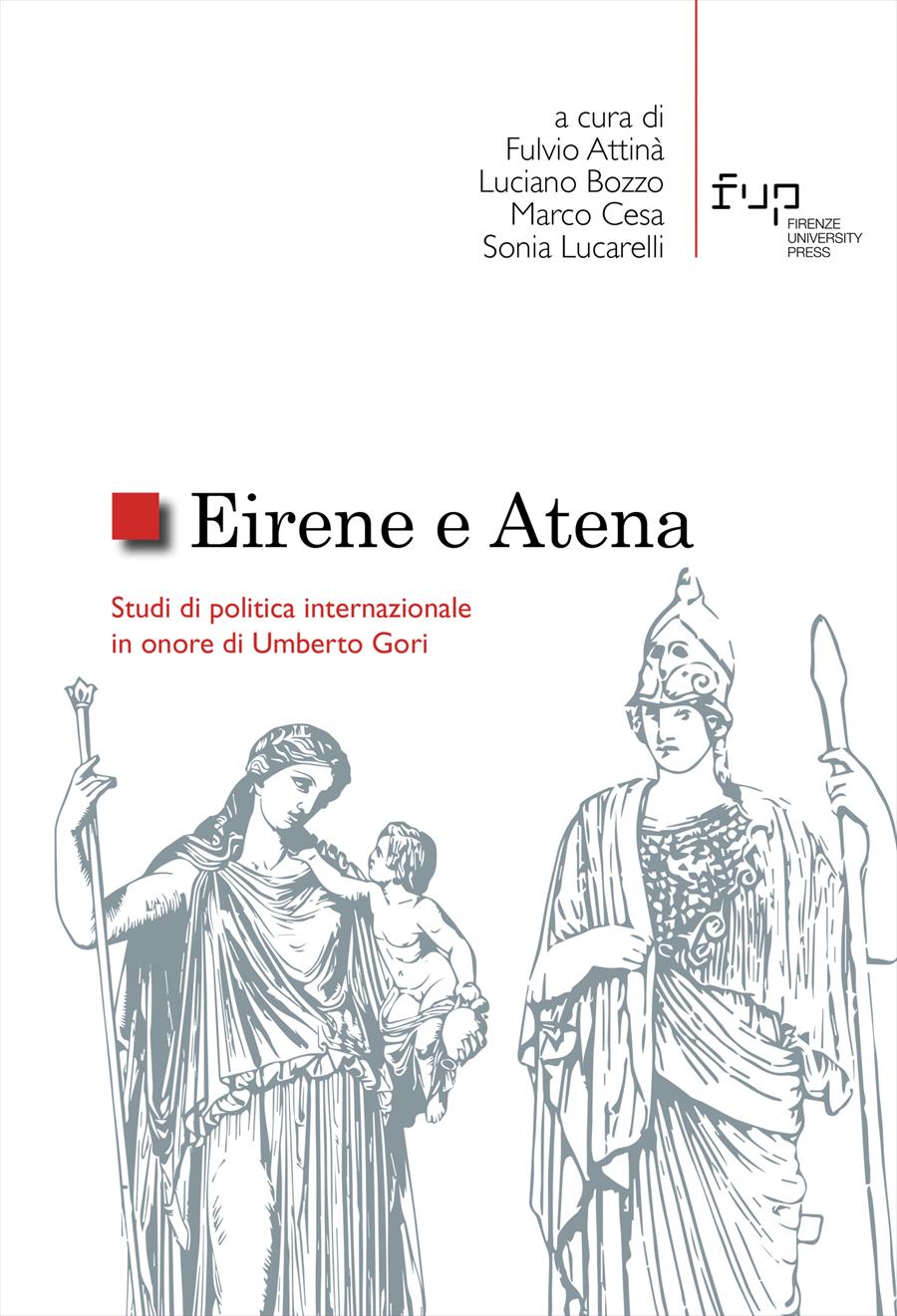- Eirene e Atena
- A cura di Fulvio Attinà, Luciano Bozzo, Marco Cesa, Sonia Lucarelli
The Appeasement Puzzle and Competition Neglect
- Costantino Pischedda
- © 2022 Author(s) |
- CC BY 4.0
- DOI: 10.36253/978-88-5518-595-0.11
Recent studies indicate that British appeasement towards Hitler followed a buying-time logic, i.e., it tried to postpone confrontation until Great Britain improved its military position through rearmament. However, this chapter shows that Germany actually extended its military edge over the appeasement years. Drawing on the literature on judgment and decision-making, the chapter theorizes that competition neglect – the tendency to focus myopically on one’s own capabilities and pay insufficient attention to those of the competition – may explain the puzzling gap between British policymakers’ plans and actual trends in the balance of power. The competition neglect thesis and an alternative explanation, positing the occurrence of miscalculation, are tested with a case study of British foreign policy towards Germany in 1937-38.
- Keywords:
- preventive war,
- competition neglect,
- appeasement,
- balance of power,
- biases,
University of Miami, United States - ORCID: 0000-0002-8784-8623
- Adamthwaite, Anthony. 1977. France and the Coming of the Second World War. London: Frank Cass.
- CAB, Cabinet Papers, National Archives. <https://www.nationalarchives.gov.uk/cabinetpapers/cabinet-gov/meetings-papers.htm> (2021-12-15).
- Camerer, Colin, and Dan Lovallo. 1999. “Overconfidence and Excess Entry: An Experimental Approach.” American Economic Review 1: 306–18.
- Churchill, Winston S. 1948. The Gathering Storm. Boston: Houghton Mifflin.
- Copeland, Dale. 2000. Origins of Major War. Ithaca: Cornell University Press.
- Gibbs, Norman H. 1976. Grand Strategy, Volume I: Rearmament Policy. London: HMSO.
- Kahneman, Daniel. 2011. Thinking, Fast and Slow. New York: Farrar, Straus and Giroux.
- Kier, Elizabeth. 1997. Imagining War: French and British Military Doctrine Between the Wars. Princeton: Princeton University Press.
- Kupchan, Charles A. 1994. Vulnerability of Empire. Ithaca: Cornell University Press.
- Layne, Christopher. 2008. “Security Studies and the Use of History: Neville Chamberlain’s Grand Strategy Revisited.” Security Studies 3: 397–437.
- Mason, Henry L. 1963. “War Comes to the Netherlands: September 1939-May 1940.” Political Science Quarterly 4: 548–80.
- Mearsheimer, John J. 2001. The Tragedy of Great Power Politics. New York: W.W. Norton.
- Moore, Don A., and Daylian M. Cain. 2007. “Overconfidence and Underconfidence: When and Why People Underestimate (and Overestimate) the Competition.” Organizational Behavior and Human Decision Processes 2: 197–213.
- Moore, Don A., and Deborah A. Small. 2007. “Error and Bias in Comparative Judgment: On Being Both Better and Worse Than We Think We Are.” Journal of Personality and Social Psychology 6: 972–89.
- Moore, Don A., John M. Oesch, and Charlene Zietsma. 2007. “What Competition? Myopic self-focus in Market-Entry Decisions.” Organization Science 3: 440–54.
- Murray, Williamson. 1984. The Change in the European Balance of Power, 1938–39: The Path to Ruin. Princeton: Princeton University Press.
- Philpott, William, and Alexander, Martin S. 2007. “The French and the British Field Force: Moral Support or Material Contribution?” Journal of Military History 3: 743–72.
- Posen, Barry R. 1984. The Sources of Military Doctrine: France, Britain, and Germany between the World Wars. Ithaca: Cornell University Press.
- Radzevick, Joseph R., and Moore, Don A. 2008. “Myopic Biases in Competitions.” Organizational Behavior and Human Decision Processes 2: 206–18.
- Ripsman, Norrin M. and Jack S. Levy. 2007. “The Preventive War that Never Happened: Britain, France, and the Rise of Germany in the 1930s.” Security Studies 1: 32–67.
- Ripsman, Norrin M. and Jack S. Levy. 2008. “Wishful Thinking or Buying Time? The Logic of British Appeasement in the 1930s.” International Security 2: 148–81.
- Ripsman, Norrin M. and Jack S. Levy. 2012. “British Grand Strategy and the Rise of Germany, 1933–1936.” In The Challenge of Grand Strategy: the Great Powers and the Broken Balance between the World Wars, edited by Jeffrey W. Taliaferro, Norrin M. Ripsman,
- Rosecrance, Richard, and Zara Steiner. 1993. “British Grand Strategy and the Origins of World War II.” In The Domestic Bases of Grand Strategy, edited by Richard Rosecrance and Arthur A. Stein, 124–53. Ithaca: Cornell University Press.
- Schweller, Randall L. 2006. Unanswered Threats: Political Constraints on the Balance of Power. Princeton: Princeton University Press.
- Schweller, Randall L. 1997. Deadly Imbalances: Tripolarity and Hitler’s Strategy of World Conquest. New York: Columbia University Press.
- Simonsohn, Uri. 2010. “eBay’s Crowded Evenings: Competition Neglect in Market Entry Decisions.” Management Science 7: 1060–73.
- Slovic, Paul, et al. 2006. “The Affect Heuristic.” European Journal of Operational Research: 1333–52.
- Taylor, Telford. 1979. Munich: The Price of Peace. Garden City: Doubleday.
- Wark, Wesley K. 1985. The Ultimate Enemy: British Intelligence and Nazi Germany, 1933–1939. Ithaca: Cornell University Press.
- Watt, Donald C. 1976. “The Historiography of Appeasement.” In Crisis and Controversy: Essays in Honour of A.J.P. Taylor, edited by Alan Sked and Chris Cook, 110–29. London: Macmillan, 1976.
Informazioni sul capitolo
Titolo del capitolo
The Appeasement Puzzle and Competition Neglect
Autori
Costantino Pischedda
Lingua
English
DOI
10.36253/978-88-5518-595-0.11
Opera sottoposta a peer review
Anno di pubblicazione
2022
Copyright
© 2022 Author(s)
Licenza d'uso
Licenza dei metadati
Informazioni bibliografiche
Titolo del libro
Eirene e Atena
Sottotitolo del libro
Studi di politica internazionale in onore di Umberto Gori
Curatori
Fulvio Attinà, Luciano Bozzo, Marco Cesa, Sonia Lucarelli
Opera sottoposta a peer review
Numero di pagine
208
Anno di pubblicazione
2022
Copyright
© 2022 Author(s)
Licenza d'uso
Licenza dei metadati
Editore
Firenze University Press
DOI
10.36253/978-88-5518-595-0
ISBN Print
978-88-5518-594-3
eISBN (pdf)
978-88-5518-595-0
Collana
Studi e saggi
ISSN della collana
2704-6478
e-ISSN della collana
2704-5919
